2021-2022学年 Unit 2 Neighbours 单元复习 课件42张不含音频
文档属性
| 名称 | 2021-2022学年 Unit 2 Neighbours 单元复习 课件42张不含音频 | 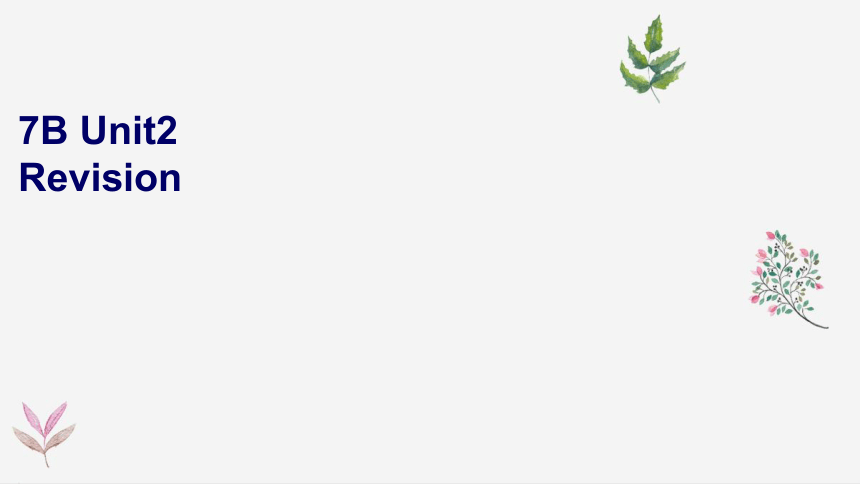 | |
| 格式 | pptx | ||
| 文件大小 | 293.5KB | ||
| 资源类型 | 教案 | ||
| 版本资源 | 牛津译林版 | ||
| 科目 | 英语 | ||
| 更新时间 | 2022-04-10 22:58:18 | ||
图片预览

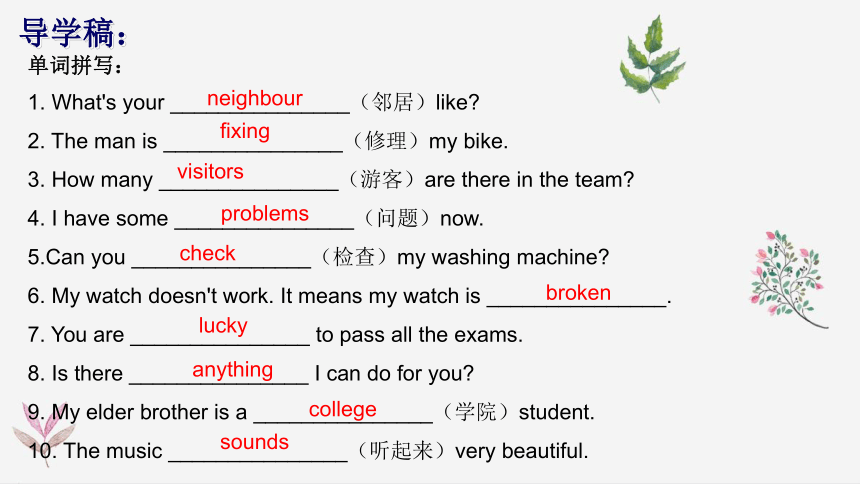

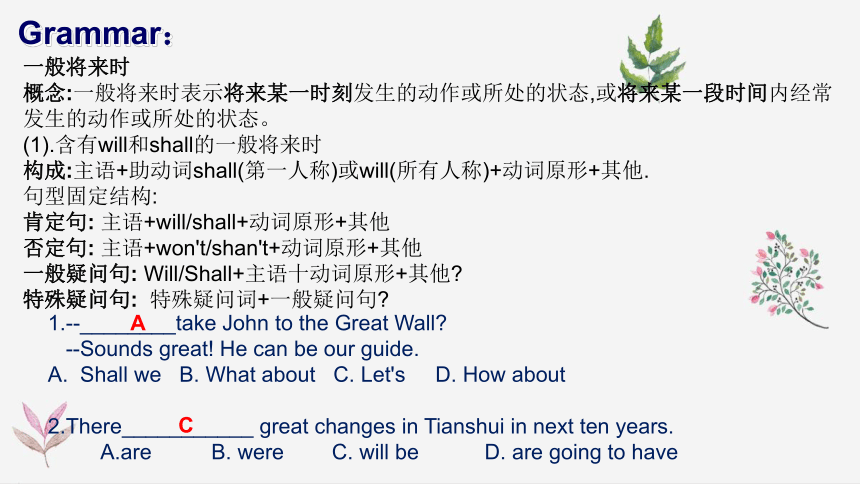

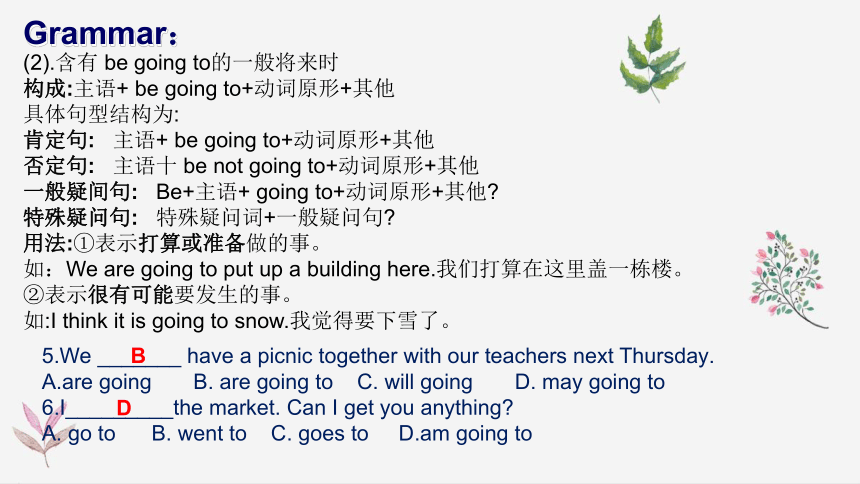
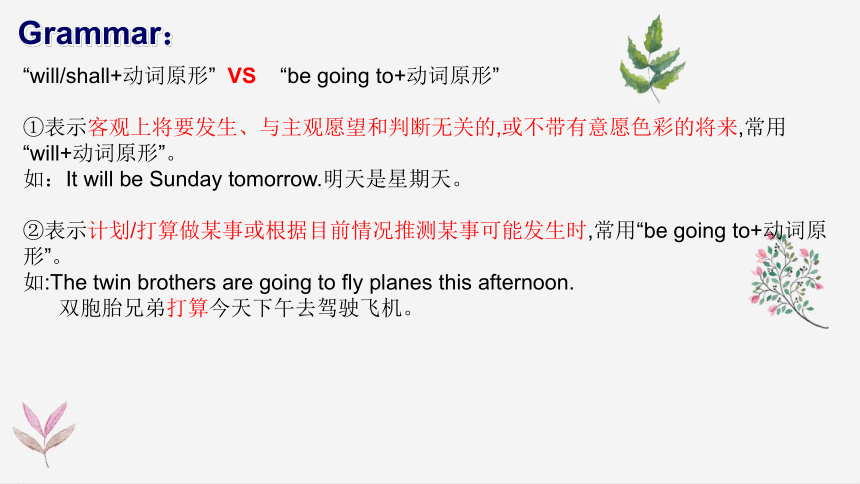
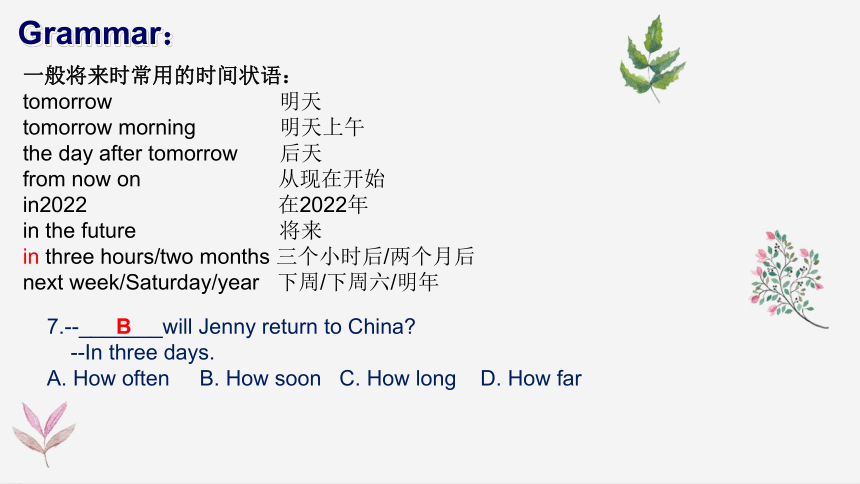
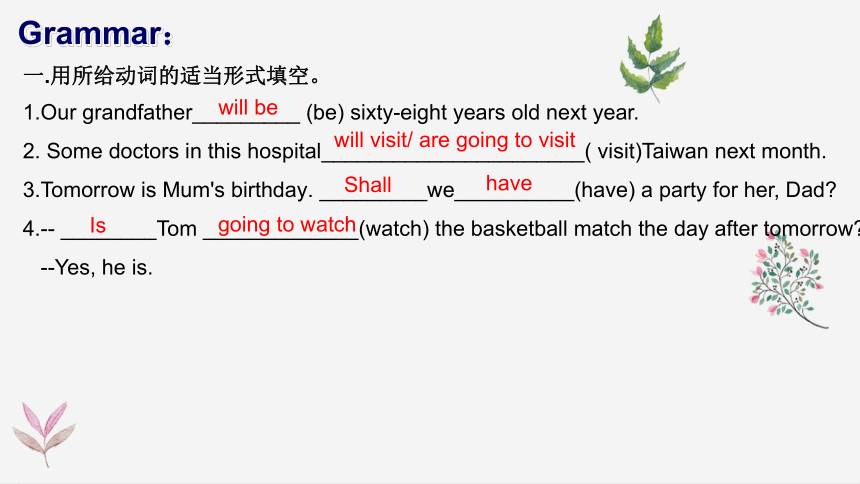
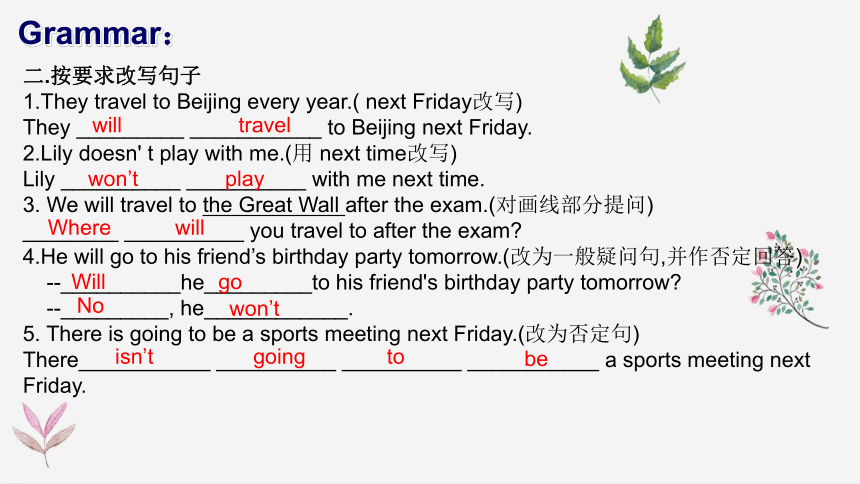
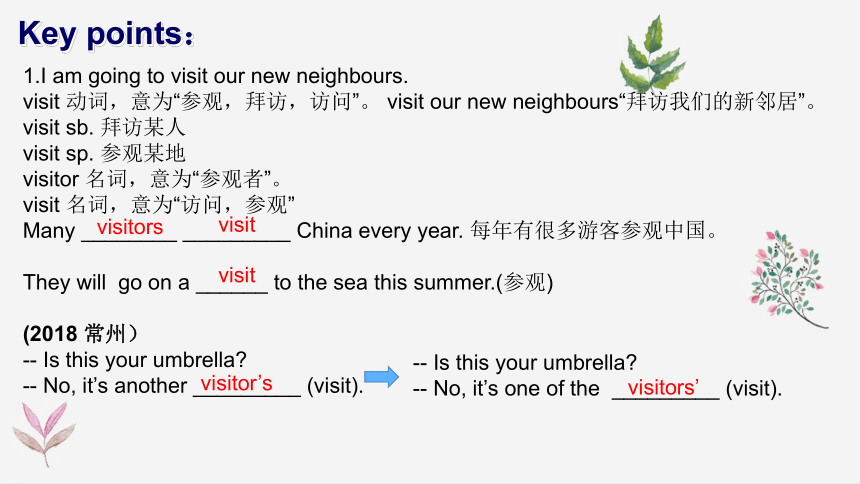
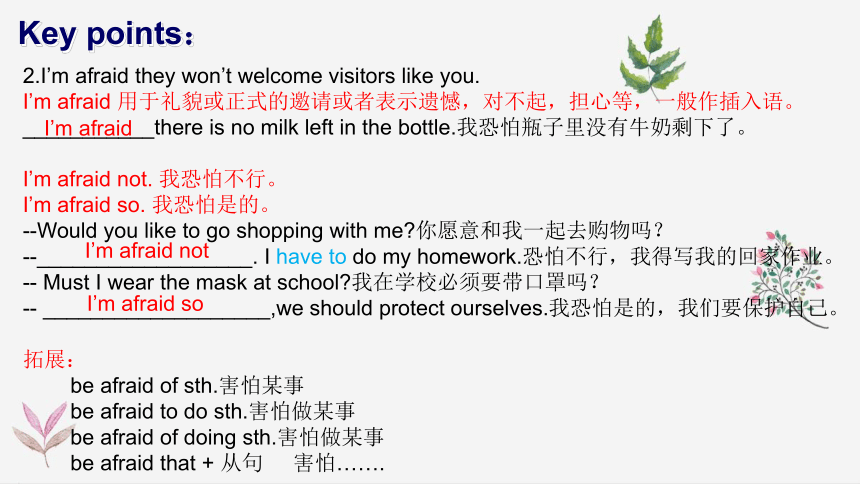
文档简介
(共42张PPT)
7B Unit2
Revision
导学稿:
单词拼写:
1. What's your _______________(邻居)like
2. The man is _______________(修理)my bike.
3. How many _______________(游客)are there in the team
4. I have some _______________(问题)now.
5.Can you _______________(检查)my washing machine
6. My watch doesn't work. It means my watch is _______________.
7. You are _______________ to pass all the exams.
8. Is there _______________ I can do for you
9. My elder brother is a _______________(学院)student.
10. The music _______________(听起来)very beautiful.
fixing
neighbour
visitors
problems
check
broken
lucky
anything
college
sounds
导学稿:
单词拼写:
11. There are two _______________(警察)at the traffic lights.
12. If you want to ask for help, you can go to the police _______________.
13. What are you going to be in the _______________(未来)
14. There are many_______________(生病的)people in the hospital.
15. You can look for much _______________(信息)on the Internet.
16. The children _______________18 can't drink wine.
17. Now many students want to be _______________(志愿者), because they want to help more people in need.
18. What's his _______________ He is a postman.
19. My friend is kind and _______________ (有帮助的).
20. I want to learn different _______________(技术).
policemen
station
future
sick
information
under
volunteers
job
helpful
skills
Grammar:
一般将来时
概念:一般将来时表示将来某一时刻发生的动作或所处的状态,或将来某一段时间内经常发生的动作或所处的状态。
(1).含有will和shall的一般将来时
构成:主语+助动词shall(第一人称)或will(所有人称)+动词原形+其他.
句型固定结构:
肯定句: 主语+will/shall+动词原形+其他
否定句: 主语+won't/shan't+动词原形+其他
一般疑问句: Will/Shall+主语十动词原形+其他
特殊疑问句: 特殊疑问词+一般疑问句
1.--________take John to the Great Wall
--Sounds great! He can be our guide.
Shall we B. What about C. Let's D. How about
2.There___________ great changes in Tianshui in next ten years.
A.are B. were C. will be D. are going to have
C
A
Grammar:
用法:①一般将来时表示将要发生的动作或情况。
如:I will/shall arrive tomorrow. 我将明天到。
②在一般将来时的句子中,有时有表示将来的时间状语,有时没有时间状语,这时要从意思上判断是否指未来的动作或情况。
如:We'll only stay for two weeks.我们将只待两个星期。
The meeting won't last long. 会议将不会持续很久。
③在以第一人称I或we作主语的问句中,一般使用助动词shall,这时或是征求对方的意见,或是询问情况。
如:Where shall we meet 我们在哪里见面
Shall we have any classes tomorrow 明天我们有课吗
I will/shall可缩写为I’ll;I will not可缩写为I won’t; I shall not可缩写为 I shan’t.
3.-- Do you know when Mrs White _______ for dinner this evening
-- No, but I think she________ when she is free.
A. will come; will come B. will come; comes C comes; will come
4.I think it is true that Jill _______to work today because she is on a trip.
A.has come B. didn 't come C. is coming D. will not come
A
D
Grammar:
(2).含有 be going to的一般将来时
构成:主语+ be going to+动词原形+其他
具体句型结构为:
肯定句: 主语+ be going to+动词原形+其他
否定句: 主语十 be not going to+动词原形+其他
一般疑间句: Be+主语+ going to+动词原形+其他
特殊疑问句: 特殊疑问词+一般疑问句
用法:①表示打算或准备做的事。
如:We are going to put up a building here.我们打算在这里盖一栋楼。
②表示很有可能要发生的事。
如:I think it is going to snow.我觉得要下雪了。
5.We _______ have a picnic together with our teachers next Thursday.
A.are going B. are going to C. will going D. may going to
6.I_________the market. Can I get you anything
A. go to B. went to C. goes to D.am going to
B
D
Grammar:
“will/shall+动词原形” VS “be going to+动词原形”
①表示客观上将要发生、与主观愿望和判断无关的,或不带有意愿色彩的将来,常用“will+动词原形”。
如:It will be Sunday tomorrow.明天是星期天。
②表示计划/打算做某事或根据目前情况推测某事可能发生时,常用“be going to+动词原形”。
如:The twin brothers are going to fly planes this afternoon.
双胞胎兄弟打算今天下午去驾驶飞机。
Grammar:
一般将来时常用的时间状语:
tomorrow 明天
tomorrow morning 明天上午
the day after tomorrow 后天
from now on 从现在开始
in2022 在2022年
in the future 将来
in three hours/two months 三个小时后/两个月后
next week/Saturday/year 下周/下周六/明年
7.--_______will Jenny return to China
--In three days.
A. How often B. How soon C. How long D. How far
B
Grammar:
一.用所给动词的适当形式填空。
1.Our grandfather_________ (be) sixty-eight years old next year.
2. Some doctors in this hospital______________________( visit)Taiwan next month.
3.Tomorrow is Mum's birthday. _________we__________(have) a party for her, Dad
4.-- ________Tom _____________(watch) the basketball match the day after tomorrow
--Yes, he is.
will be
will visit/ are going to visit
Shall
have
Is
going to watch
Grammar:
二.按要求改写句子
1.They travel to Beijing every year.( next Friday改写)
They _________ ___________ to Beijing next Friday.
2.Lily doesn' t play with me.(用 next time改写)
Lily __________ __________ with me next time.
3. We will travel to the Great Wall after the exam.(对画线部分提问)
________ __________ you travel to after the exam
4.He will go to his friend’s birthday party tomorrow.(改为一般疑问句,并作否定回答)
--__________he_________to his friend's birthday party tomorrow
--_________, he____________.
5. There is going to be a sports meeting next Friday.(改为否定句)
There___________ __________ __________ ___________ a sports meeting next Friday.
will
travel
won’t
play
Where
will
Will
go
No
won’t
isn’t
going
to
be
Key points:
1.I am going to visit our new neighbours.
visit 动词,意为“参观,拜访,访问”。 visit our new neighbours“拜访我们的新邻居”。
visit sb. 拜访某人
visit sp. 参观某地
visitor 名词,意为“参观者”。
visit 名词,意为“访问,参观”
Many ________ _________ China every year. 每年有很多游客参观中国。
They will go on a ______ to the sea this summer.(参观)
(2018 常州)
-- Is this your umbrella
-- No, it’s another _________ (visit).
visitors
visit
visit
visitor’s
-- Is this your umbrella
-- No, it’s one of the _________ (visit).
visitors’
Key points:
2.I’m afraid they won’t welcome visitors like you.
I’m afraid 用于礼貌或正式的邀请或者表示遗憾,对不起,担心等,一般作插入语。
___________there is no milk left in the bottle.我恐怕瓶子里没有牛奶剩下了。
I’m afraid not. 我恐怕不行。
I’m afraid so. 我恐怕是的。
--Would you like to go shopping with me 你愿意和我一起去购物吗?
--__________________. I have to do my homework.恐怕不行,我得写我的回家作业。
-- Must I wear the mask at school 我在学校必须要带口罩吗?
-- ___________________,we should protect ourselves.我恐怕是的,我们要保护自己。
拓展:
be afraid of sth.害怕某事
be afraid to do sth.害怕做某事
be afraid of doing sth.害怕做某事
be afraid that + 从句 害怕…….
I’m afraid not
I’m afraid
I’m afraid so
Key points:
3.I’m afraid they won’t welcome visitors like you.
like, 介词,意为 “像,类似,…..怎么样”。不能单独使用,要与动词连用。
be like 像
look like 看起来像
seem like 仿佛,似乎
like, 动词,意为 “喜欢”,反义词“dislike”, like sb./ sth./doing sth.
He,________ his mother, _________ reading.(like)
-- Is the boy over there your friend
-- No, he isn’t. Nobody _______ a person _______ him.
A.like; like B. likes; likes C. like; likes D. likes; like
like
likes
D
Key points:
4. Most of them have 14 floors.
most+ n. 大多数
= most + of + ( the ) + n./pron.某范围的大多数
大多数游客______________________
游客中的大多数_____________________________
他们中的大多数_____________________________
________ children in the poor areas have no money to go to school.
A. most the B. Mostly of C. the mostly of D. Most
most visitors
most of the visitors
most of them
D
Key points:
5. It’s good to live in a neighbourhood like that.住在像那样的社区真好。
It’s +形容词+(for sb.)+ to do (对于某人来说)做某事是…的
每天早上跑步是很好的。
It ’s good . You read a book like that.(合并为一句)
It ’s good _______ _______ ______ ________ a book like that.
for
It’s good to go jogging every morning.
you
to
read
Key points:
6.They’re kind and helpful.
be helpful 愿意帮忙的,有用的 (当表示有用的时候,可以用be of some help替代)
________________________________________
李老师是一个乐于助人的老师,我们都喜欢她。
be helpful to 对......有用的 =be of some help to
This kind of dictionary should ________________ students. I want to buy one.
这种字典应该对学生有用,我想买一本。
反义词:helpless 无用的,没有帮助的
拓展:help sb. with sth./to do sth. /do sth.
He often ______________________________________ 他经常帮助妈妈做家务。
helps his mother with/ to do/ do housework.
be helpful to
Mrs. Li is a helpful teacher and we all like her.
Key points:
help oneself (to) 自用,自取
Help ___________ (自己) to some fish, Tom.
Help ___________ (自己) to some fish, children.
help out 分担......工作,帮一把
When something worries me, they always come to___________.当我有烦恼时,他们总是来帮一把。
with the help of......在……帮助下
_________________________, I worked out the math problem.在老师的帮助下,我做出了这道数学题。
help out
yourself
yourselves
With the help of the teacher
Key points:
7. They often meet at the community centre and share their different skills.
skill, 名词,意为“技能,技巧”,既可作可数名词,又可作不可数名词。表示在某方面的技能或者技巧,通常后面加at或者in。
__________________________________你能向我们展示一下你的厨艺吗?
reading skills阅读技巧
study skills学习技巧
writing skills写作技巧
Driving __________ (skill) are quite important when we drive a car.
skills
Can you show us your cooking skills
Key points:
8. They help us with all kinds of problems.
problem:指客观存在的,等待解决的问题,着重指困难的问题或有关运算的问题。常与solve和work out 搭配。
question:指人们主观上提出的等待回答的问题,常与ask和answer搭配。
She can’t ___________________.她无法解决这个问题。
Please ___________________ in English.请用英语回答我的问题。
answer my question
solve the problem
Key points:
9. There is something wrong with my computer.
There is something wrong with sth. =Sth. doesn’t work.=Sth. is not working well.
=Sth. is broken.
something wrong 不定代词修饰形容词,放在形容词的前面。
_________________________________________今天报纸上有什么有趣的事情吗?
something作主语时谓语动词用单数,其相应的代词也用单数形式。
___________ ___________ wrong with my computer.我的电脑坏了。
___________ ___________ impossible if you put your heart into it.
如果你用心去做,没有什么是不可能的。
_____________________________________________ 听!有人在房间唱歌。
当有else 修饰不定代词时,else应放在不定代词后面。
Ask ___________ ____________ to help you.叫其他人帮助你吧。
Something
Is there anything interesting in today’s newspaper
is
Nothing
is
Listen! Someone is singing in the room.
somebody
else
Key points:
10. I’m going to ask an engineer to check it.
ask sb. (not) to do sth. 要求/叫某人(不)要做某事
ask (sb.) for sth.(向某人)要求某物
ask sb. about sth. 向某人询问某事的情况
______________________________________________________________
我们老师要求离开教室前关灯。
We can __________________when we are in trouble.
我们碰到困难时可以向警察求助。
He _____________________________ COVID-19. 他问了我几个关于冠状病毒的问题。
ask the police for help
Our teacher asks us to turn off the lights before we leave the classroom.
asked me some questions about
Key points:
I’m going to ask an engineer to check it.
an engineer 一个工程师
I want to be ______engineer when I grow up.
A.a B. an C. the
check 动词,后面接名词或者代词作宾语
check in (在旅馆登记办理入住手续)
check out 结账退房
Please __________ these figures.
请核实这些数字。
check 名词 “检查,支票,账单”
你能检查一下你的回家作业吗?
Can you give your homework_____________
check
B
a check
Key points:
11.My cousin Annie’s bicycle is broken, so she is going to ask someone to fix it.
broken,形容词,意为“损坏了的,破碎的”,作表语或定语。动词形式为break(打破,打碎)
The cup_____________, I need to buy a new one. 茶杯坏了,我需要买一个新的。
fix,动词,意为“修理”,作及物动词时后面直接跟名词或者代词等作宾语。现在分词fixing。
_________________________________ 你能帮我修理这张坏的桌子吗?
Can you help me fix the broken desk
is broken
Key points:
12. Some college students are ready to help.
be ready to do sth. 乐意/愿意做某事/准备做某事 = be willing to do sth.
get ready to do sth. 准备做某事
be/ get ready for sth. 为…做准备
get sth. ready for sb. 为某人准备好某物
Most of my neighbours ________________ help others. Some of them often __________________the old. 我的大部分邻居都乐意帮助别人,一些人经常给老人准备食物。
Please _____________________________________________
请为考试做好准备。
get food ready for
are ready to
get ready to have the exam./ for the exam.
Key points:
13.Some of them often visit the old people and do some shopping for them.
do some shopping = go shopping 买东西
do+ some+ v.-ing 常表示一些笼统且不指明的事。
do some cleaning
do some reading
do some washing
do some cooking
do some writing
Key points:
14.You are lucky to live in a neighbourhood like that.
be lucky to do sth. 做某事是幸运的
________________________ 我幸运地通过了考试。
luck n.
unlucky adj.
unluckily
a lucky dog 幸运儿
_____________, I passed the exam.
______________, it is raining heavily outside.
Luckily
I’m lucky to pass the exam.
Unluckily
Key points:
15.She is going to make a fire.
make a fire 生火,还可以用start a fire来表达相同的意思。
The snow made them feel cold, so they had to__________________________.
雪使他们感到寒冷,所以他们不得不生火取暖。
make a fire to keep warm
Key points:
16. policeman
policeman, 名词,意为“警察”,复数形式为policemen,一般多指男性,可与确切的数字连用。其对应词应为policeman。
postman -- postmen
salesman -- salesmen
fireman -- firemen
spaceman – spacemen
英语中单数名词变复数名词时,不需要把词尾man改成men的单词有:
Walkman – Walkmans
German – Germans
单独的police为集体名词,the police表示复数意义,作主语时谓语动词用复数。
_______________________________________警察们正在搜寻走丢的女孩。
The police are searching for the lost girl.
Key points:
17. police station
station, 名词,意为“局,所,站”,常与其他单词一起构成一个特定的地点名词。
________________________________________ 他们会把这些小偷送到警察局。
radio station 广播电台
railway station 火车站
They will send the thieves to the police station.
Key points:
18. Wendy’s elder brother.
elder adj. 年纪教长的,表示家庭成员间的长幼关系,反义词younger。
my elder brother/sister/son/daughter
_______________________ 他是我哥哥。
older, old 的比较级,表示“比…老的”
My _________ brother is three years ________ than I am. 我的哥哥比我大三岁。
elder
He is my elder brother.
older
Key points:
19.so she goes to work by train.
by train 为介词短语,“乘火车”,是固定结构,“by+交通工具”表示用……交通方式。
in/on 后接表示交通工具的名词,名词前加冠词,物主代词或指示性代词。
by 后接表示交通工具的名词且要用单数形式
take+冠词+交通工具+ to someplace
=go to someplace by + 交通工具
对by+交通工具提问用how
--How do you usually go to school 你通常怎样去学校的?
--I often go to school_______________________. But this morning I went to school _______________ because my bike is broken.
我经常自己骑车去上学,但是今天早晨坐的我爸爸的车,因为我自行车坏了。
in my dad’s car
by bike/ on my bike
Key points:
20.What are you going to be in the future
in the future 在将来
Who knows what will happen____________ 谁知道将来会发生什么呢?
future adj. 将来的,未来的
in future =from now on 从今以后
____________, be more careful with your homework.从今以后,作业更小心点。
In future
in the future
Key points:
21. That sounds like a good idea.
sound 听起来,后直接跟形容词作表语,构成系表结构
感官系动词:sound, feel, smell , taste, look
__________________________ 这个故事听起来有趣吗?
Yes, very interesting.是的,非常有趣。
sound n. 大自然的声音
noise n. 噪音
voice n. 人的嗓音
She has a beautiful_________ .她有一个甜美的嗓音。
Can you hear the ________ of the train 你能听到火车的声音吗?
Don’t make any ________ in the library.在图书馆不要发出任何噪音。
voice
Does the story sound interesting
sound
noise
Key points:
22.I want to help sick people.
sick adj. 生病的,恶心的。可作表语和定语。名词形式为sickness
ill adj. 作表语表示生病的,作定语表示坏的。名词形式为illness
The _______ boy looks very weak.这个生病的男孩看起来很虚弱。
He is a man with ______ fame(名声).他是个名声很坏的人。
ill
sick
Key points:
23. more or less 副词性短语,意为“大约,有点,或多或少”。
The boy ______________ tired.这个男孩有点累了。
It took _______________a whole day to paint the wall.
粉刷墙壁用了将近一整天的时间。
What you did will _______________ be helpful to us.
你所做的事或多或少将对我们有帮助。
more or less
is more or less
more or less
Key points:
24.Please look at the information below.
information 不可数名词 无复数形式
He wants to_____________________.他想得到进一步信息。
a piece of information
two pieces of information
below 副词 反义词 above
读下面的单词并多加练习。
__________________ and practise more.
below 还作介词, 表示(位置)在......下面,反义词 above
She lives____________________ .她住我楼下两层。
Read the words below
get further information
two floors below me
Key points:
25. They will make you feel better.
feel better 感觉好些,bettter是形容词,意为“较好的”,是形容词well(身体好)的比较级。
I don’t_________. I think I have a cold.我觉得不舒服,我想我感冒了。
feel good 也可以用来表示人的身体状况。
I don’t ___________ today.我今天感觉不太舒服。
feel too good
feel well
Key points:
26.Are you worrying about what to wear to a party or how to design your home
worry about sb./sth.担心某人,某事
worry about (not) doing sth. 担心做某事
worried adj.人担心的
be worried about sb./ sth./doing sth.
worrying adj. 令人担心的
Don’t_________________, I ’m ok.不要担心我,我很好。
You shouldn’t____________________________.你不应该担心不能通过考试。
I have never spent ___________________ 我从未过过如此令人担忧的一天。
worry about not passing the exam
worry about me
such a worrying day.
Key points:
27.All group members know a lot about styles and colours.
group 名词,意为“组,群”, a group of意为“一群……”, in groups 意为“分组,成群结队的”。
_______________________________________________ 我们今晚一群人要去剧院。
group还可以作为动词,意为 “分组,组成小组”,group into 表示“把…分成… ”
Let’s ______________________ teams of six to practice.咱们分成六人一组来练习吧。
group ourselves into
A group of us are going to the theatre this evening.
Key points:
28. They’ll be happy to give you some ideas.
be happy to do sth.
be + adj. + to do sth.结构,形容词是表示人感觉的词,动词不定式表示原因。
_______________________________ 我很高兴再一次见到你。
_________________________________我们都很抱歉听到那个。
I am very excited _______ that the government will build a high-speed railway from Guangzhou to Xiamen.
A.hear B. to hear C. hears D. hearing
类似:
be sad/glad/excited/pleased + to do sth.
B
I’m happy to see you again.
We are all sorry to hear that.
Exercises:
句子翻译
I . 我打算这个周末去帮助我们社区的老人购物。
2.我的姐姐在一家当地医院做护士。
3. 杰克生病了,很多人都为他担心。
4. 我恐怕你的电脑有些问题,你得找人修一下。
5. 我花了将近一个星期时间读完这本书。
I am going to do some shopping for the old in our community this weekend.
Jack is ill, many people are worried about him.
My elder sister works as a nurse in a local hospital.
I am afraid there is something wrong with your computer, you have to find someone
to fix it .
I spent more or less a week finishing reading the book.
Thank you for listening!
7B Unit2
Revision
导学稿:
单词拼写:
1. What's your _______________(邻居)like
2. The man is _______________(修理)my bike.
3. How many _______________(游客)are there in the team
4. I have some _______________(问题)now.
5.Can you _______________(检查)my washing machine
6. My watch doesn't work. It means my watch is _______________.
7. You are _______________ to pass all the exams.
8. Is there _______________ I can do for you
9. My elder brother is a _______________(学院)student.
10. The music _______________(听起来)very beautiful.
fixing
neighbour
visitors
problems
check
broken
lucky
anything
college
sounds
导学稿:
单词拼写:
11. There are two _______________(警察)at the traffic lights.
12. If you want to ask for help, you can go to the police _______________.
13. What are you going to be in the _______________(未来)
14. There are many_______________(生病的)people in the hospital.
15. You can look for much _______________(信息)on the Internet.
16. The children _______________18 can't drink wine.
17. Now many students want to be _______________(志愿者), because they want to help more people in need.
18. What's his _______________ He is a postman.
19. My friend is kind and _______________ (有帮助的).
20. I want to learn different _______________(技术).
policemen
station
future
sick
information
under
volunteers
job
helpful
skills
Grammar:
一般将来时
概念:一般将来时表示将来某一时刻发生的动作或所处的状态,或将来某一段时间内经常发生的动作或所处的状态。
(1).含有will和shall的一般将来时
构成:主语+助动词shall(第一人称)或will(所有人称)+动词原形+其他.
句型固定结构:
肯定句: 主语+will/shall+动词原形+其他
否定句: 主语+won't/shan't+动词原形+其他
一般疑问句: Will/Shall+主语十动词原形+其他
特殊疑问句: 特殊疑问词+一般疑问句
1.--________take John to the Great Wall
--Sounds great! He can be our guide.
Shall we B. What about C. Let's D. How about
2.There___________ great changes in Tianshui in next ten years.
A.are B. were C. will be D. are going to have
C
A
Grammar:
用法:①一般将来时表示将要发生的动作或情况。
如:I will/shall arrive tomorrow. 我将明天到。
②在一般将来时的句子中,有时有表示将来的时间状语,有时没有时间状语,这时要从意思上判断是否指未来的动作或情况。
如:We'll only stay for two weeks.我们将只待两个星期。
The meeting won't last long. 会议将不会持续很久。
③在以第一人称I或we作主语的问句中,一般使用助动词shall,这时或是征求对方的意见,或是询问情况。
如:Where shall we meet 我们在哪里见面
Shall we have any classes tomorrow 明天我们有课吗
I will/shall可缩写为I’ll;I will not可缩写为I won’t; I shall not可缩写为 I shan’t.
3.-- Do you know when Mrs White _______ for dinner this evening
-- No, but I think she________ when she is free.
A. will come; will come B. will come; comes C comes; will come
4.I think it is true that Jill _______to work today because she is on a trip.
A.has come B. didn 't come C. is coming D. will not come
A
D
Grammar:
(2).含有 be going to的一般将来时
构成:主语+ be going to+动词原形+其他
具体句型结构为:
肯定句: 主语+ be going to+动词原形+其他
否定句: 主语十 be not going to+动词原形+其他
一般疑间句: Be+主语+ going to+动词原形+其他
特殊疑问句: 特殊疑问词+一般疑问句
用法:①表示打算或准备做的事。
如:We are going to put up a building here.我们打算在这里盖一栋楼。
②表示很有可能要发生的事。
如:I think it is going to snow.我觉得要下雪了。
5.We _______ have a picnic together with our teachers next Thursday.
A.are going B. are going to C. will going D. may going to
6.I_________the market. Can I get you anything
A. go to B. went to C. goes to D.am going to
B
D
Grammar:
“will/shall+动词原形” VS “be going to+动词原形”
①表示客观上将要发生、与主观愿望和判断无关的,或不带有意愿色彩的将来,常用“will+动词原形”。
如:It will be Sunday tomorrow.明天是星期天。
②表示计划/打算做某事或根据目前情况推测某事可能发生时,常用“be going to+动词原形”。
如:The twin brothers are going to fly planes this afternoon.
双胞胎兄弟打算今天下午去驾驶飞机。
Grammar:
一般将来时常用的时间状语:
tomorrow 明天
tomorrow morning 明天上午
the day after tomorrow 后天
from now on 从现在开始
in2022 在2022年
in the future 将来
in three hours/two months 三个小时后/两个月后
next week/Saturday/year 下周/下周六/明年
7.--_______will Jenny return to China
--In three days.
A. How often B. How soon C. How long D. How far
B
Grammar:
一.用所给动词的适当形式填空。
1.Our grandfather_________ (be) sixty-eight years old next year.
2. Some doctors in this hospital______________________( visit)Taiwan next month.
3.Tomorrow is Mum's birthday. _________we__________(have) a party for her, Dad
4.-- ________Tom _____________(watch) the basketball match the day after tomorrow
--Yes, he is.
will be
will visit/ are going to visit
Shall
have
Is
going to watch
Grammar:
二.按要求改写句子
1.They travel to Beijing every year.( next Friday改写)
They _________ ___________ to Beijing next Friday.
2.Lily doesn' t play with me.(用 next time改写)
Lily __________ __________ with me next time.
3. We will travel to the Great Wall after the exam.(对画线部分提问)
________ __________ you travel to after the exam
4.He will go to his friend’s birthday party tomorrow.(改为一般疑问句,并作否定回答)
--__________he_________to his friend's birthday party tomorrow
--_________, he____________.
5. There is going to be a sports meeting next Friday.(改为否定句)
There___________ __________ __________ ___________ a sports meeting next Friday.
will
travel
won’t
play
Where
will
Will
go
No
won’t
isn’t
going
to
be
Key points:
1.I am going to visit our new neighbours.
visit 动词,意为“参观,拜访,访问”。 visit our new neighbours“拜访我们的新邻居”。
visit sb. 拜访某人
visit sp. 参观某地
visitor 名词,意为“参观者”。
visit 名词,意为“访问,参观”
Many ________ _________ China every year. 每年有很多游客参观中国。
They will go on a ______ to the sea this summer.(参观)
(2018 常州)
-- Is this your umbrella
-- No, it’s another _________ (visit).
visitors
visit
visit
visitor’s
-- Is this your umbrella
-- No, it’s one of the _________ (visit).
visitors’
Key points:
2.I’m afraid they won’t welcome visitors like you.
I’m afraid 用于礼貌或正式的邀请或者表示遗憾,对不起,担心等,一般作插入语。
___________there is no milk left in the bottle.我恐怕瓶子里没有牛奶剩下了。
I’m afraid not. 我恐怕不行。
I’m afraid so. 我恐怕是的。
--Would you like to go shopping with me 你愿意和我一起去购物吗?
--__________________. I have to do my homework.恐怕不行,我得写我的回家作业。
-- Must I wear the mask at school 我在学校必须要带口罩吗?
-- ___________________,we should protect ourselves.我恐怕是的,我们要保护自己。
拓展:
be afraid of sth.害怕某事
be afraid to do sth.害怕做某事
be afraid of doing sth.害怕做某事
be afraid that + 从句 害怕…….
I’m afraid not
I’m afraid
I’m afraid so
Key points:
3.I’m afraid they won’t welcome visitors like you.
like, 介词,意为 “像,类似,…..怎么样”。不能单独使用,要与动词连用。
be like 像
look like 看起来像
seem like 仿佛,似乎
like, 动词,意为 “喜欢”,反义词“dislike”, like sb./ sth./doing sth.
He,________ his mother, _________ reading.(like)
-- Is the boy over there your friend
-- No, he isn’t. Nobody _______ a person _______ him.
A.like; like B. likes; likes C. like; likes D. likes; like
like
likes
D
Key points:
4. Most of them have 14 floors.
most+ n. 大多数
= most + of + ( the ) + n./pron.某范围的大多数
大多数游客______________________
游客中的大多数_____________________________
他们中的大多数_____________________________
________ children in the poor areas have no money to go to school.
A. most the B. Mostly of C. the mostly of D. Most
most visitors
most of the visitors
most of them
D
Key points:
5. It’s good to live in a neighbourhood like that.住在像那样的社区真好。
It’s +形容词+(for sb.)+ to do (对于某人来说)做某事是…的
每天早上跑步是很好的。
It ’s good . You read a book like that.(合并为一句)
It ’s good _______ _______ ______ ________ a book like that.
for
It’s good to go jogging every morning.
you
to
read
Key points:
6.They’re kind and helpful.
be helpful 愿意帮忙的,有用的 (当表示有用的时候,可以用be of some help替代)
________________________________________
李老师是一个乐于助人的老师,我们都喜欢她。
be helpful to 对......有用的 =be of some help to
This kind of dictionary should ________________ students. I want to buy one.
这种字典应该对学生有用,我想买一本。
反义词:helpless 无用的,没有帮助的
拓展:help sb. with sth./to do sth. /do sth.
He often ______________________________________ 他经常帮助妈妈做家务。
helps his mother with/ to do/ do housework.
be helpful to
Mrs. Li is a helpful teacher and we all like her.
Key points:
help oneself (to) 自用,自取
Help ___________ (自己) to some fish, Tom.
Help ___________ (自己) to some fish, children.
help out 分担......工作,帮一把
When something worries me, they always come to___________.当我有烦恼时,他们总是来帮一把。
with the help of......在……帮助下
_________________________, I worked out the math problem.在老师的帮助下,我做出了这道数学题。
help out
yourself
yourselves
With the help of the teacher
Key points:
7. They often meet at the community centre and share their different skills.
skill, 名词,意为“技能,技巧”,既可作可数名词,又可作不可数名词。表示在某方面的技能或者技巧,通常后面加at或者in。
__________________________________你能向我们展示一下你的厨艺吗?
reading skills阅读技巧
study skills学习技巧
writing skills写作技巧
Driving __________ (skill) are quite important when we drive a car.
skills
Can you show us your cooking skills
Key points:
8. They help us with all kinds of problems.
problem:指客观存在的,等待解决的问题,着重指困难的问题或有关运算的问题。常与solve和work out 搭配。
question:指人们主观上提出的等待回答的问题,常与ask和answer搭配。
She can’t ___________________.她无法解决这个问题。
Please ___________________ in English.请用英语回答我的问题。
answer my question
solve the problem
Key points:
9. There is something wrong with my computer.
There is something wrong with sth. =Sth. doesn’t work.=Sth. is not working well.
=Sth. is broken.
something wrong 不定代词修饰形容词,放在形容词的前面。
_________________________________________今天报纸上有什么有趣的事情吗?
something作主语时谓语动词用单数,其相应的代词也用单数形式。
___________ ___________ wrong with my computer.我的电脑坏了。
___________ ___________ impossible if you put your heart into it.
如果你用心去做,没有什么是不可能的。
_____________________________________________ 听!有人在房间唱歌。
当有else 修饰不定代词时,else应放在不定代词后面。
Ask ___________ ____________ to help you.叫其他人帮助你吧。
Something
Is there anything interesting in today’s newspaper
is
Nothing
is
Listen! Someone is singing in the room.
somebody
else
Key points:
10. I’m going to ask an engineer to check it.
ask sb. (not) to do sth. 要求/叫某人(不)要做某事
ask (sb.) for sth.(向某人)要求某物
ask sb. about sth. 向某人询问某事的情况
______________________________________________________________
我们老师要求离开教室前关灯。
We can __________________when we are in trouble.
我们碰到困难时可以向警察求助。
He _____________________________ COVID-19. 他问了我几个关于冠状病毒的问题。
ask the police for help
Our teacher asks us to turn off the lights before we leave the classroom.
asked me some questions about
Key points:
I’m going to ask an engineer to check it.
an engineer 一个工程师
I want to be ______engineer when I grow up.
A.a B. an C. the
check 动词,后面接名词或者代词作宾语
check in (在旅馆登记办理入住手续)
check out 结账退房
Please __________ these figures.
请核实这些数字。
check 名词 “检查,支票,账单”
你能检查一下你的回家作业吗?
Can you give your homework_____________
check
B
a check
Key points:
11.My cousin Annie’s bicycle is broken, so she is going to ask someone to fix it.
broken,形容词,意为“损坏了的,破碎的”,作表语或定语。动词形式为break(打破,打碎)
The cup_____________, I need to buy a new one. 茶杯坏了,我需要买一个新的。
fix,动词,意为“修理”,作及物动词时后面直接跟名词或者代词等作宾语。现在分词fixing。
_________________________________ 你能帮我修理这张坏的桌子吗?
Can you help me fix the broken desk
is broken
Key points:
12. Some college students are ready to help.
be ready to do sth. 乐意/愿意做某事/准备做某事 = be willing to do sth.
get ready to do sth. 准备做某事
be/ get ready for sth. 为…做准备
get sth. ready for sb. 为某人准备好某物
Most of my neighbours ________________ help others. Some of them often __________________the old. 我的大部分邻居都乐意帮助别人,一些人经常给老人准备食物。
Please _____________________________________________
请为考试做好准备。
get food ready for
are ready to
get ready to have the exam./ for the exam.
Key points:
13.Some of them often visit the old people and do some shopping for them.
do some shopping = go shopping 买东西
do+ some+ v.-ing 常表示一些笼统且不指明的事。
do some cleaning
do some reading
do some washing
do some cooking
do some writing
Key points:
14.You are lucky to live in a neighbourhood like that.
be lucky to do sth. 做某事是幸运的
________________________ 我幸运地通过了考试。
luck n.
unlucky adj.
unluckily
a lucky dog 幸运儿
_____________, I passed the exam.
______________, it is raining heavily outside.
Luckily
I’m lucky to pass the exam.
Unluckily
Key points:
15.She is going to make a fire.
make a fire 生火,还可以用start a fire来表达相同的意思。
The snow made them feel cold, so they had to__________________________.
雪使他们感到寒冷,所以他们不得不生火取暖。
make a fire to keep warm
Key points:
16. policeman
policeman, 名词,意为“警察”,复数形式为policemen,一般多指男性,可与确切的数字连用。其对应词应为policeman。
postman -- postmen
salesman -- salesmen
fireman -- firemen
spaceman – spacemen
英语中单数名词变复数名词时,不需要把词尾man改成men的单词有:
Walkman – Walkmans
German – Germans
单独的police为集体名词,the police表示复数意义,作主语时谓语动词用复数。
_______________________________________警察们正在搜寻走丢的女孩。
The police are searching for the lost girl.
Key points:
17. police station
station, 名词,意为“局,所,站”,常与其他单词一起构成一个特定的地点名词。
________________________________________ 他们会把这些小偷送到警察局。
radio station 广播电台
railway station 火车站
They will send the thieves to the police station.
Key points:
18. Wendy’s elder brother.
elder adj. 年纪教长的,表示家庭成员间的长幼关系,反义词younger。
my elder brother/sister/son/daughter
_______________________ 他是我哥哥。
older, old 的比较级,表示“比…老的”
My _________ brother is three years ________ than I am. 我的哥哥比我大三岁。
elder
He is my elder brother.
older
Key points:
19.so she goes to work by train.
by train 为介词短语,“乘火车”,是固定结构,“by+交通工具”表示用……交通方式。
in/on 后接表示交通工具的名词,名词前加冠词,物主代词或指示性代词。
by 后接表示交通工具的名词且要用单数形式
take+冠词+交通工具+ to someplace
=go to someplace by + 交通工具
对by+交通工具提问用how
--How do you usually go to school 你通常怎样去学校的?
--I often go to school_______________________. But this morning I went to school _______________ because my bike is broken.
我经常自己骑车去上学,但是今天早晨坐的我爸爸的车,因为我自行车坏了。
in my dad’s car
by bike/ on my bike
Key points:
20.What are you going to be in the future
in the future 在将来
Who knows what will happen____________ 谁知道将来会发生什么呢?
future adj. 将来的,未来的
in future =from now on 从今以后
____________, be more careful with your homework.从今以后,作业更小心点。
In future
in the future
Key points:
21. That sounds like a good idea.
sound 听起来,后直接跟形容词作表语,构成系表结构
感官系动词:sound, feel, smell , taste, look
__________________________ 这个故事听起来有趣吗?
Yes, very interesting.是的,非常有趣。
sound n. 大自然的声音
noise n. 噪音
voice n. 人的嗓音
She has a beautiful_________ .她有一个甜美的嗓音。
Can you hear the ________ of the train 你能听到火车的声音吗?
Don’t make any ________ in the library.在图书馆不要发出任何噪音。
voice
Does the story sound interesting
sound
noise
Key points:
22.I want to help sick people.
sick adj. 生病的,恶心的。可作表语和定语。名词形式为sickness
ill adj. 作表语表示生病的,作定语表示坏的。名词形式为illness
The _______ boy looks very weak.这个生病的男孩看起来很虚弱。
He is a man with ______ fame(名声).他是个名声很坏的人。
ill
sick
Key points:
23. more or less 副词性短语,意为“大约,有点,或多或少”。
The boy ______________ tired.这个男孩有点累了。
It took _______________a whole day to paint the wall.
粉刷墙壁用了将近一整天的时间。
What you did will _______________ be helpful to us.
你所做的事或多或少将对我们有帮助。
more or less
is more or less
more or less
Key points:
24.Please look at the information below.
information 不可数名词 无复数形式
He wants to_____________________.他想得到进一步信息。
a piece of information
two pieces of information
below 副词 反义词 above
读下面的单词并多加练习。
__________________ and practise more.
below 还作介词, 表示(位置)在......下面,反义词 above
She lives____________________ .她住我楼下两层。
Read the words below
get further information
two floors below me
Key points:
25. They will make you feel better.
feel better 感觉好些,bettter是形容词,意为“较好的”,是形容词well(身体好)的比较级。
I don’t_________. I think I have a cold.我觉得不舒服,我想我感冒了。
feel good 也可以用来表示人的身体状况。
I don’t ___________ today.我今天感觉不太舒服。
feel too good
feel well
Key points:
26.Are you worrying about what to wear to a party or how to design your home
worry about sb./sth.担心某人,某事
worry about (not) doing sth. 担心做某事
worried adj.人担心的
be worried about sb./ sth./doing sth.
worrying adj. 令人担心的
Don’t_________________, I ’m ok.不要担心我,我很好。
You shouldn’t____________________________.你不应该担心不能通过考试。
I have never spent ___________________ 我从未过过如此令人担忧的一天。
worry about not passing the exam
worry about me
such a worrying day.
Key points:
27.All group members know a lot about styles and colours.
group 名词,意为“组,群”, a group of意为“一群……”, in groups 意为“分组,成群结队的”。
_______________________________________________ 我们今晚一群人要去剧院。
group还可以作为动词,意为 “分组,组成小组”,group into 表示“把…分成… ”
Let’s ______________________ teams of six to practice.咱们分成六人一组来练习吧。
group ourselves into
A group of us are going to the theatre this evening.
Key points:
28. They’ll be happy to give you some ideas.
be happy to do sth.
be + adj. + to do sth.结构,形容词是表示人感觉的词,动词不定式表示原因。
_______________________________ 我很高兴再一次见到你。
_________________________________我们都很抱歉听到那个。
I am very excited _______ that the government will build a high-speed railway from Guangzhou to Xiamen.
A.hear B. to hear C. hears D. hearing
类似:
be sad/glad/excited/pleased + to do sth.
B
I’m happy to see you again.
We are all sorry to hear that.
Exercises:
句子翻译
I . 我打算这个周末去帮助我们社区的老人购物。
2.我的姐姐在一家当地医院做护士。
3. 杰克生病了,很多人都为他担心。
4. 我恐怕你的电脑有些问题,你得找人修一下。
5. 我花了将近一个星期时间读完这本书。
I am going to do some shopping for the old in our community this weekend.
Jack is ill, many people are worried about him.
My elder sister works as a nurse in a local hospital.
I am afraid there is something wrong with your computer, you have to find someone
to fix it .
I spent more or less a week finishing reading the book.
Thank you for listening!
